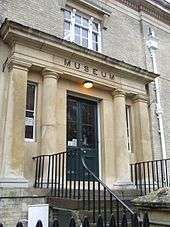Wisbech & Fenland Museum


The Wisbech & Fenland Museum, located in the town of Wisbech in Cambridgeshire, England, is one of the oldest purpose-built museums in the United Kingdom.[1] [2] The Museum Society was founded in 1835 and was originally located at 16 Old Market Place. Its collection of Natural Science specimens, antiquities and curios soon outgrew the premises and it re-located to the present purpose-built building in 1847.
Originally designed to house both the Museum and Literary Society, the latter ceased in 1877 and the Museum trustees became the sole owners.[3] The building unfortunately suffers from subsidence, due mainly to its location. Having been sited over the location of the former moat to the Wisbech Castle, settlement of the back-fill has resulted in movement to the front elevation of the building closest to St Peter's Church.
The museum houses a number of important collections relating to local history and the anti-slavery campaigner Thomas Clarkson. Its star exhibit is the original manuscript of Charles Dickens' Great Expectations, the bequest of Chauncy Hare Townshend.[4] Other notable artefacts include Napoleon's Sèvres breakfast service, said to have been captured at the Battle of Waterloo and Thomas Clarkson's chest, containing examples of 18th century African textiles, seeds and leatherwork which he used to illustrate his case for direct trade with Africa.
References
- ↑ Wisbech & Fenland Museum, Culture24, UK.
- ↑ Listing on Cornucopia, URL accessed 25 June 2008.
- ↑ http://www.wisbech-society.co.uk/museum.html The Wisbech Society & Preservation Trust, Wisbech & Fenland Museum
- ↑ Wisbech and Fenland Museum, Stride Guides.
External links
- Official website
- Wisbech and Fenland Museum information from The National Archives, UK
Coordinates: 52°39′50″N 0°09′40″E / 52.663857°N 0.160976°E